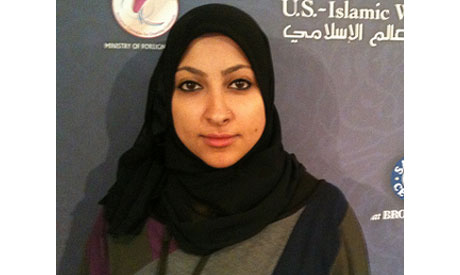ahram.org.egHuman rights activist Maryam Al-Khawaja says the clampdown on pro-democracy protestors continues in Bahrain as her father marks 56 days on hunger strike The Bahraini uprising that erupted in February 2011 was a thorn in the side of the Gulf monarchies fearing that the wave of Arab uprisings that had ousted dictators in Egypt, Tunisia and Libya could threaten their own thrones. Weary of the dangers posed by the democratic sentiments being voiced by Bahraini protesters, Saudi Arabia, the most powerful of the Gulf kingdoms, sent troops to Bahrain in order to quell mass protests in March 2011. The Bahraini government then tore down the landmark Pearl Square monument in the capital Manama, the epicentre of the protest movement, in an effort to prevent further protests. More than a year later, protests still persist in the face of lethal government force, according to Bahraini activist Maryam Al-Khawaja in interview with Ahram Online. “Human rights violations are still being committed on a daily basis,” she said, sitting in a conference room in downtown Cairo after finally being allowed to enter the Egyptian capital. Al-Khawaja was kept at the airport for several hours without being given a clear reason why. A human rights activist herself, Al-Khawaja is on a mission to expose rights violations and abuses by the Bahraini government against peaceful protesters asking for a fair and democratic system. She heads the foreign relations office at the Bahrain Centre for Human Rights (BCHR) and the Gulf Centre for Human Rights. “Our job is mainly documentation and reporting,” she explained. “It’s about making sure that the world knows what's going on in Bahrain.” Al-Khawaja, whose father, a co-founder and former president of the BCHR, has just appealed against a life sentence for crimes against the state, talked about the disparity between what the Bahraini government says it is doing and what is actually happening on the ground. It isn’t new for the Bahraini government to look into the human rights situation and investigate alleged violations and then do nothing about them, she said. A government-mandated independent probe into the events of February and March 2011 was carried out last year and a report produced in November. The Bahrain Independent Commission of Inquiry (BICI) found many reports of abuse by regime forces to be true and gave recommendations for reform. “The government is trying to sell the idea to the West that they've implemented reforms, that they're working on them, that they take time, and that people need to wait,” Al-Khawaja said. However, the “people who have committed the past violations are either the same ones committing them today — they've been promoted in some cases — or they're not being held accountable.” Al-Khawaja underlined the necessity of accountability if the reforms to be carried out by the government are to be taken seriously. However, not only are the officials responsible not being held to account, she claimed, but crimes are still being committed. “The number of deaths we've had after the cases documented by the BICI are more than the ones registered during the BICI period,” Al-Khawaja said. As for the degree of violence now used compared to that probed by the BICI, this has only increased, she said, with cases documented by the BCHR. The latest victim of security force violence in Bahrain was Ahmed Ismail Hassan Al-Samadi, reportedly shot on 2 April by men affiliated with the country’s riot police as he filmed protesters affected by tear gas. While clashes between protesters and police occur almost daily in Bahrain, media coverage and international attention leaves much to be desired, according to activists. Days since the first post-uprising Arab League summit meeting in Baghdad in March, the issue of Bahrain has once again disappeared from discussion. Iraqi Foreign Minister Hoshyar Zebari stated the week before the summit was held that the Bahrain issue was not on the summit agenda. While she expressed her disappointment at the removal of the Bahraini issue from the agenda of the Arab League summit meeting, Al-Khawaja said that Iraq’s keenness for Gulf countries to attend the summit may have prompted its removal. Al-Khawaja testified on the Bahraini situation before a 2011 human rights commission in the US Congress, and today she says that most Arab governments are silent about the situation in the country, as is the West. She told Ahram Online that “given the situation now, the West is definitely an accomplice” in the clampdown. Al-Khawaja criticised what she said was the West’s inconsistency in criticising Russia for sending arms to the Syrian regime, while doing “the exact same thing” in Bahrain. “Now we’re at a point where they’re either ready to do the right thing by standing with democracy and human rights, or they’re not, and they’re choosing not to,” she said. Al-Khawaja said that “We’re still talking about a situation in which a barrel of oil is more valuable than a human life. It’s this that we need to change.” Abdulhadi Al-Khawaja, Maryam's father, has now been on hunger strike for 56 days. Authorities said Wednesday that he was transfered to a prison clinic for close medical observation. NGOs have warned that Bahrain is responsible for the life of Abdulhadi. "The Bahraini government and the ruling family will be held responsible for any harm resulting from the ongoing (hunger) strike of rights activist Abdulhadi Al-Khawaja," a statement issued by the Gulf Forum for Civil Societies said.
M WAQAR..... "A man's ethical behavior should be based effectually on sympathy, education, and social ties; no religious basis is necessary.Man would indeed be in a poor way if he had to be restrained by fear of punishment and hope of reward after death." --Albert Einstein !!! NEWS,ARTICLES,EDITORIALS,MUSIC... Ze chi pe mayeen yum da agha pukhtunistan de.....(Liberal,Progressive,Secular World.)''Secularism is not against religion; it is the message of humanity.'' تل ده وی پثتونستآن

No comments:
Post a Comment